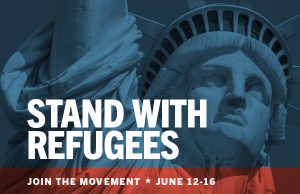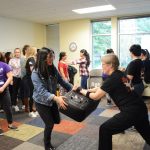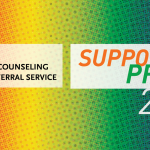Putting the American Dream Within Reach
By Caitlin Foster, Americorps Citizenship Aide
Le Troung Cao calls the United States “The Freedom Country.” After years of dreaming of a nation where, as he says, “you have freedom of speech, freedom of worship, the freedom to pray and live however you want,” a Buddhist organization sponsored his visa, helping him become a lawful permanent resident. A devout Buddhist monk, Le is giggly and intensely witty. He was eager to tell us his immigration story and the ways ACRS helped him on his journey to becoming a U.S. citizen.
Immigrants who embark on the path to U.S. citizenship face an extremely complicated system and they must first meet certain qualifications before they are even eligible to apply. One of these requirements is that they must first become a lawful permanent resident (LPR). The process for becoming an LPR is a challenge in its own right because of the long wait times and fees. Many applicants applying to come to the United States through the family or employment-based visa application process face a backlog of months or even years to secure permanent residency. Only a fraction of applicants successfully complete the process, with most sponsored by a family member or their employer. Family applications can have wait times ranging from a few months to 20 years depending on the country of origin, and relationship to the petitioner. Applications based on employment are contingent on already having been hired in a foreign nation, with no guarantee of permanent residency status.
The U.S. Department of Homeland Security (DHS) estimates that U.S. Citizenship and Immigration Services (USCIS), the federal agency which oversees lawful immigration to the U.S., receives about 6 million petitions and applications each year. In 2015 (most current information available), only about 1 in 6 applicants (1,051,031) were granted LPR status. Washington state ranked 11th in the nation, with 24,765 new LPRs. Of those in Washington, over 19,000 live in the Seattle-Tacoma-Bellevue area, and the top four countries of origin for these individuals are China, India, the Philippines and Vietnam, respectively.
Le’s quest to become a U.S. citizen was fueled by his desire to help others. He is thankful for the opportunities he’s had, “because the American government helped me get my green card, I want to help people get to America and live like me.” His life in America is spiritually fruitful. He loves spending his days serving other people in any way he can. “In my temple, every day, I pray for many people. I work in my Buddhist organization, and every week, I speak the Buddhist sutra with so many people. I cook for many people, I arrange flowers for many people to enjoy, and I play music.”
The picture he paints of his life in Vietnam provides a sharp contrast. He loves the culture, history and spirit of his home country, but was driven to leave because “(my) country has no freedom. Communist countries have no freedom. In my country, anything you eat is full of pollution. The air, the water, is full of chemicals. But here, the air is fresh. And Americans are free to speak however they want, to pray however they want.”
Once someone becomes a lawful permanent resident, they must be at least 18 years of age and have resided in (be physically present in) the United States for at least five years at the time of application. Finally, they must be of “good moral character.” Most of the clients that we serve at ACRS meet all of these requirements, but come through our doors seeking help overcoming two other significant barriers: cost and English proficiency.
In recent months, ACRS’ citizenship program has seen a marked uptick in clients seeking help in filing their applications for U.S. citizenship. There was an increase of 8% in the number of citizenship applications ACRS filed in March of 2017 compared with March 2016. Anxiety surrounding recent high-profile instances of racial harassment and President Trump’s attempts to restrict immigration has driven an increasing number of people to seek advice on filing the N-400 (the application for U.S. citizenship, which currently has a $725 filing fee) and the I-90 (the application to renew green cards) forms.
Cost is not an issue for some clients, and we are able to help many others secure a reduced filing fee or have it waived entirely. Still, the citizenship interview is notoriously tricky. Not only must applicants pass an examination on U.S. history and civics (comprised of questions that often stump even native-born citizens), they must also answer detailed questions about their lives that involve advanced vocabulary words (like “paramilitary,” “hereditary title,” or “habitual drunkard”), and demonstrate fluency in English conversation, reading and writing. Many immigrants attempting citizenship are elderly and from nations that use non-alphabetic writing systems or have no written language at all, which creates additional hurdles. In 2016, ACRS assisted 771 applicants with filing their N-400 form and offered the professional guidance and reassurance they needed.
Le was nervous about filling out the N-400 and decided to seek help from one of Seattle’s immigration assistance organizations. He chose ACRS because many of his friends from the Buddhist community recommended it, and his experience here was positive. “ACRS’ citizenship class is so good. Many students come here to study, and then many pass their interview. I love it here!” He highly recommends studying with long-time citizenship teacher and case manager Thu-Van Nguyen, who shares his Vietnamese cultural background, because her grammar lessons are clear and her pronunciation tutoring is both expert and patient.
Despite his months of preparation, Le felt a bit nervous the week before his interview. That same week and as part of his preparations, we practiced several mock interviews. Additional preparation with Thu-Van and her volunteers calmed his nerves. When it was time for his interview, he felt good. He actually enjoyed chatting with his interviewer, saying “we had the same kind of conversation I’m having with you now!” He passed with ease. He told the officer, “I love America. It lights my heart.”
Le recalls his oath ceremony with a powerful mix of emotions. He was overjoyed to see and speak with 200 new citizens from 34 countries and he wept both with joy and sorrow when they handed him his certificate. His success evoked memories of the many Vietnamese people who died trying to escape tragedy in their home country and turned his thoughts to the refugees who undertake the same perilous journeys today. “I remembered my uncle. He died in the Pacific Ocean. So many Vietnamese died. I cried for the many people who die, today, in the sea, the desert, the forest, trying to find freedom. Trying to reach a happy country.” By this point, Le’s tears fogged up his glasses. He took them off, briefly cleaning them on his robe before tucking them, and his hands, under his chin. We asked him how it felt to be a U.S. citizen. His voice was shaky, but he smiled softly. “I am super, super happy.”
Now that he’s a U.S. citizen, Le shares his plans for the future, “America loves me. It loves everyone. So many people came to welcome me to the United States. It reminds me that God, priests, the Buddha…tell me to love everyone. I want to help everyone, in the United States and outside.”
Le’s story is unique, but he has a lot in common with many others in our diverse community. June is Immigrant Heritage Month, but at ACRS, we work year-round to help community members achieve their “American Dream” by connecting them with the services they need to fully participate in our society and economy, including English language classes, job training and more. Over the last four decades, clients have found hope and opportunity when they come through our doors. In the process, they’ve also found their voice. We’ve helped clients share their stories about coming to and living in the U.S. with our elected and other leaders, because it is often through stories that non-immigrants come to appreciate the struggles that immigrants and refugees in our communities live with each and every single day. More recently, we’ve launched our Asian American Pacific Islander Democracy Initiative as a formal program. Our work has grown to help newly minted citizens exercise their civic voice through the power of voting. Learn more about how we’re helping our clients participate in our democracy at https://acrs.org/democracy-in-action/.
If you or someone you know would benefit from working with our citizenship team, please contact us at (206) 695-7600 or by emailing xiangpingc@acrs.org.
 Refugees are not the same as immigrants, but they are another group of people who come to the U.S. seeking opportunity and a better life. You can join the movement to welcome refugees to the United States by joining the Stand With Refugees campaign, June 12-16, 2017 by calling 1-844-4STAND5, or texting “STAND” to 313131 to join the movement now. Visit StandWithRefugees.us to learn more about the movement and additional ways to get involved. #refugeeswelcome
Refugees are not the same as immigrants, but they are another group of people who come to the U.S. seeking opportunity and a better life. You can join the movement to welcome refugees to the United States by joining the Stand With Refugees campaign, June 12-16, 2017 by calling 1-844-4STAND5, or texting “STAND” to 313131 to join the movement now. Visit StandWithRefugees.us to learn more about the movement and additional ways to get involved. #refugeeswelcome






